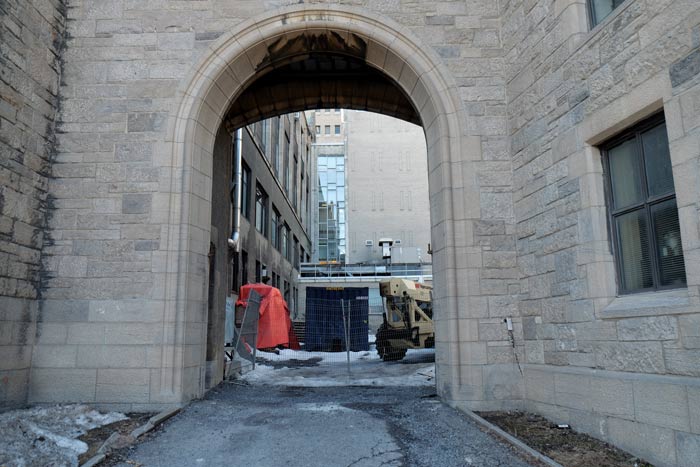In January 2018, a demolition project to replace the heating, ventilation, and air conditioning (HVAC) system in the Lyman Duff Medical Building sixth floor mechanical room caused a water leak in the north-east staircase. The leak has posed an inconvenience for staff in the building, which has a history of construction problems, and is home to many laboratories for a number of departments.
Partly funded by the Government of Canada’s Strategic Investment Fund, Duff’s refurbishing is one of several McGill construction projects aimed at improving outdated facilities. According to Jasmin Chahal, a Ph.D. candidate in Microbiology and Immunology (MIMM) and Lyman-Duff representative, new ventilation systems were necessary to avoid potentially dangerous consequences after a ventilation pipe installation in December 2017 interfered with the functioning of fume hoods in Duff.
“We have toxic chemicals in the fume hoods and then sometimes, due to ventilation, the fume hoods just stop working,” Chahal said. “We realized [the malfunction] when we started smelling the chemicals. What we did at the time [of the incident] was [that] we’d do our work and then just shut [the fume hood].”
One month later, in January 2018, water began leaking into Duff auditorium B23 due to the building’s roof deterioration and corroding corrosion. In an email to The McGill Tribune, Facilities Management and Ancillary Services Communications Manager Julie Fortier confirmed that the faulty pipes have since been replaced and that more permanent solutions are being considered for the neglected roof.
“The replacement of the roof at the Lyman Duff Building is on our priority list,” Fortier wrote. “The University has about 1.3 billion dollars worth of deferred maintenance work, so it is difficult to say at this stage when we will be able to proceed with that project.”
According to Chahal, the building has faced infrastructural problems for several years. Over one year ago, a hot water pipe burst overnight, flooding Duff room 600 and damaging an MacBook computer, four desk chairs, and lab notebooks.
“Our lab was big and everything got damaged,” Chahal said. “[The water] came from a very dirty pipe so it was dusty and dirty. We work with RNA, and RNA is very unstable […], so we couldn’t work with RNA at all for a week at least.”
Construction projects in Duff and other buildings on campus cause countless logistical difficulties for students, beyond the risks that faulty handiwork pose. For example, laboratory construction in the Stewart Biology Building that began in May 2017 has led many first-year biology labs to be relocated to the Duff Building.
The Duff Building HVAC renovations are expected to finish in December 2018. However, Microbiology and Immunology Graduate Student Association (MIGSA) President Patrick Lypaczewski is skeptical of the completion date, considering the university’s history of delaying construction timelines.
“[The changing deadlines is a topic] that keeps coming up during staff meetings,” Lypaczewski said. “It isn’t just that the admin isn’t telling the students enough. It’s also that the admin and the profs don’t know enough. McGill can’t control what the [construction] companies do but they can give clear instructions as to communications.”









